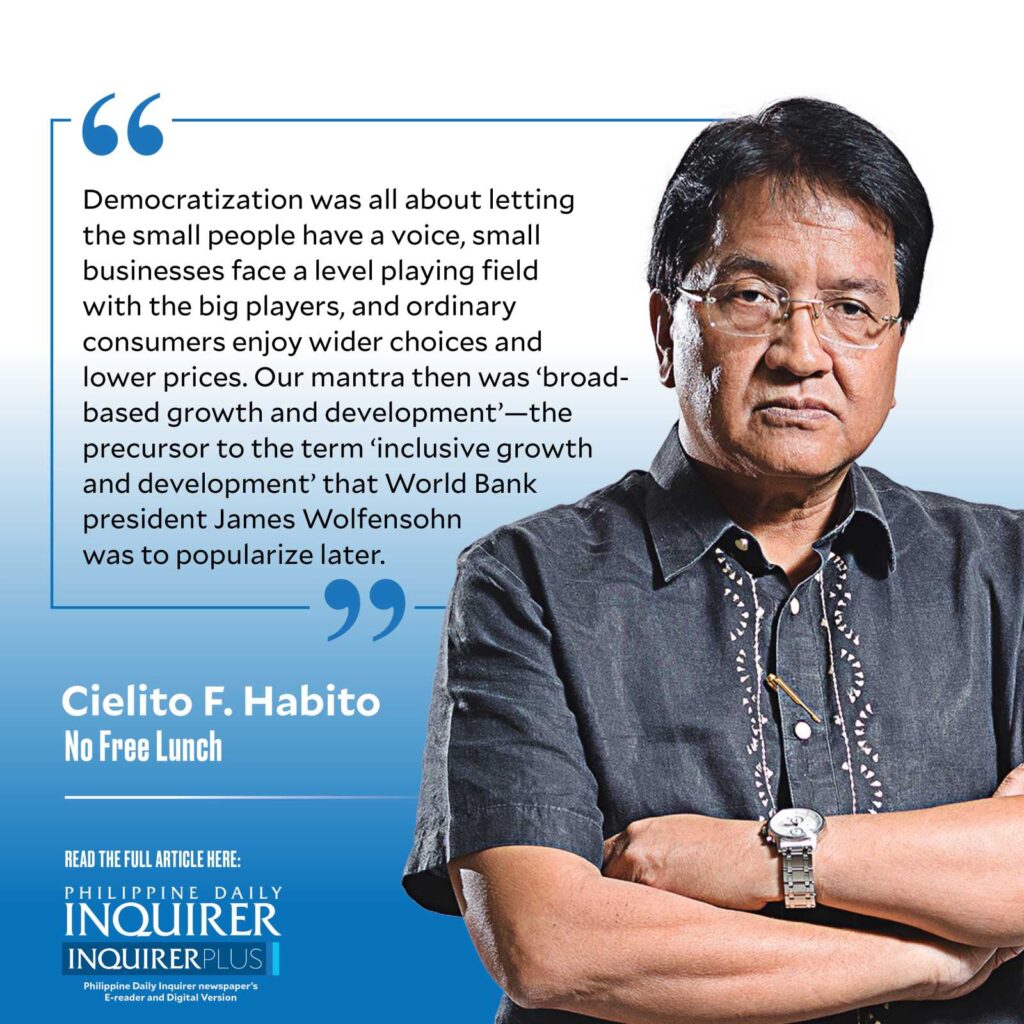Democratizing the economy

The Philippine Long Distance Telephone (PLDT) Company used to have a monopoly on telephone services, and Philippine Airlines (PAL) on domestic airline services in the country. It took over six years from when my wife filed an application for our telephone line in early 1984, to the time we finally got it in 1990. It would have taken more had I not been a senior official at the National Economic and Development Authority by then. Having met a PLDT executive in a meeting, I mentioned to him our long-standing application. Lo and behold, we had our phone line in two days! Over six long years, they had given various excuses why it still wasn’t possible to get our connection. But it was, all along.
Former president Fidel V. Ramos moved to open up those erstwhile monopolies to competition early in his presidency in the 1990s. Democratization, particularly in the economic context, was the third D in his well-defined 5D development strategy (I discussed the first two Ds of devolution and decentralization last week). President Corazon Aquino was already credited with restoring democracy in the political and institutional spheres in the wake of the 1986 Edsa People Power Revolution. But when Ramos took office in 1992, the economy was anything but democratic, especially due to legally sanctioned monopolies controlling key economic sectors, with telecommunications and domestic civil aviation being prominent. The result had been higher prices and/or inadequate services, with ordinary consumers getting the proverbial short end of the stick. It thus fell on Ramos to extend democratization to the economic sphere, a task he took to heart.
Democratization was all about letting the small people have a voice, small businesses face a level playing field with the big players, and ordinary consumers enjoy wider choices and lower prices. Our mantra then was “broad-based growth and development”—the precursor to the term “inclusive growth and development” that World Bank president James Wolfensohn was to popularize later. I found myself in a public debate with a senator who argued for the exact opposite: he pushed for an “export armada” strategy to accelerate our economic growth—meaning, focus attention and resources on a few identified fast-growing exports, support them to the hilt, and let the resulting rapid economic growth trickle down to the bottom. I argued that experience has shown that “trickle down” does not work, and it was better to have a broader base of participation in our economy’s growth at the outset, hence broader benefits from it, even if it meant growth not as rapid as the export armada strategy he pushed for.
Democratization was also about enabling small and medium enterprises (SMEs), which hinged on faithful implementation of the Magna Carta for SMEs (Republic Act No. 6977) enacted under the Cory Aquino administration. A particular constraint had always been access to financing and improved technologies for our small farms and firms. When our country hosted the annual Asia-Pacific Economic Cooperation meeting in 1996, we focused its theme on SMEs, and set up the Apec Center for Technology Exchange and Transfer for SMEs in Los Baños, as a tangible contribution. Unfortunately, the center never got to operate the way Ramos envisioned it.
Back to monopolies, then national security adviser and Ramos’ vision and strategy guru Gen. Jose “JoeAl” Almonte was known to be waging a crusade to break up cartels and monopolies. Among the policy instruments to achieve this end was the 1995 Public Telecommunications Policy Act (RA 7925), which opened the industry to more players, while Ramos’ Executive Order No. 59 forced their interconnection. Also in 1995, Ramos issued EO 219 which opened up the airline industry. Thus ended the telephone and airline monopolies, and the rest is history.
I pointed out then how opening up to competition unleashed such rapid growth in their markets, that PLDT’s and PAL’s respective slices of their now-divided market “bibingkas” ended up even bigger than the entire bibingkas they used to monopolize. In the end, democratization had a win-win outcome, for industry players and consumers alike.
—————–cielito.habito@gmail.com
Disclaimer: The comments uploaded on this site do not necessarily represent or reflect the views of management and owner of Cebudailynews. We reserve the right to exclude comments that we deem to be inconsistent with our editorial standards.
